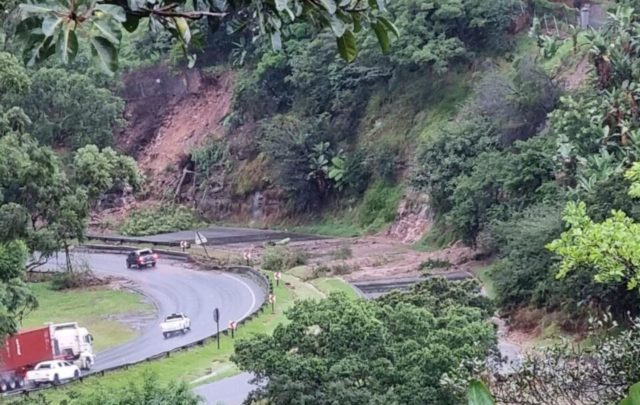A staggering 351mm of rain was recorded at Virginia Airport in Durban over the last 24 hours – more than doubling the previous rainfall record in the city of 165mm of rain in April 2019.
DURBAN – A staggering 351mm of rain was recorded at Virginia Airport in Durban over the last 24 hours – more than doubling the previous rainfall record in the city of 165mm of rain in April 2019.
And more of these severe weather events can be expected, according to a UKZN climate change expert.
This as mopping-up operations continued across KwaZulu-Natal on Tuesday, with reports of houses having collapsed, cars washed away, raging rivers and major routes blocked with mud and debris following a horrific night of torrential rain and flash floods.
Emergency and rescue crews worked through the night responding to calls for help from people trapped in houses, on top of roofs and in cars as banks and roads washed away. The number of dead and injured are still be confirmed.
The SA Weather Service confirmed that over 200mm fell in the Durban area, with some areas getting more than others. Virginia Airport measured 351mm, King Shaka International Airport 255mm, with areas such as Wentworth measuring 124mm, and down the South Coast Margate measured 311mm, while the North Coast was not so badly hit, with only with 89mm and Pietermaritzburg measuring 98mm.
Forecaster Ishmael Moyo said on Tuesday morning that rain was expected to continue into the afternoon and evening, but that there would be lighter showers than previously experienced over the last 24 hours.
On Tuesday, University of KwaZulu-Natal climate change expert Professor Tafadzwanashe Mabhaudi said weather extremes resulting in flooding could be expected to occur again and the level of preparedness for such devastating weather events needed to be addressed.
“Whether it’s drought or flash floods, we do expect more weather extremes due to climate change. Not too long ago (2019) we had flooding and massive landslides and this is now becoming a pattern. There is a low level of preparedness and only the SA Weather Service issued a warning.
“People were caught unawares and there needs to be more long-term preparedness in terms of building capacity to deal with these events, as well as putting information out as that people living in low-lying areas and flood prone areas need to be aware and prepared,” said Mabhaudi.
Town planning expert from University of KwaZulu-Natal Professor Hangwelani Magidimisha-Chipungu said that low-lying areas “were not the problem, but at the receiving end of the problem” and becoming victims.
“We need to invest in catchment areas, hilly areas where the infrastructure and drainage needs to be sound. If that doesn’t happen, a lot of water which should be contained in the catchment areas ends up in the low-lying areas.
“The infrastructure in low-lying areas, the drainage systems also need to be sound and carry the capacity within its own environment.
“We also need to look at issues of flooding from the perspective of urbanisation. Why do we end up having people staying in informal settlements and in low-lying areas which are prone to floods? The level of urbanisation is unprecedented, it is so high. It’s not followed by sound infrastructure for the people. We have opened our cities, but where are they going to stay?
“They utilise open spaces and for town planning, we leave open spaces as they are not ideal for residential purposes.
“People need to be educated that some areas, especially low-lying areas, are prone to flooding,” said Magidimisha-Chipungu, highlighting that research indicated which areas were most likely to experience flooding and therefore not suitable for residential purposes, and because of climate change the issue around disaster and flooding was cropping up more frequently.
Ethekwini mayor Mxolisi Kaunda held a media briefing at midday on Tuesday when he said emergency teams were “working tirelessly” in affected areas, especially with regard to water and electricity services being impacted in different areas across the cities.
He called on churches and NGOs to help assist with those affected by the floods. “We need all hands on to help save lives,” said Kaunda.








